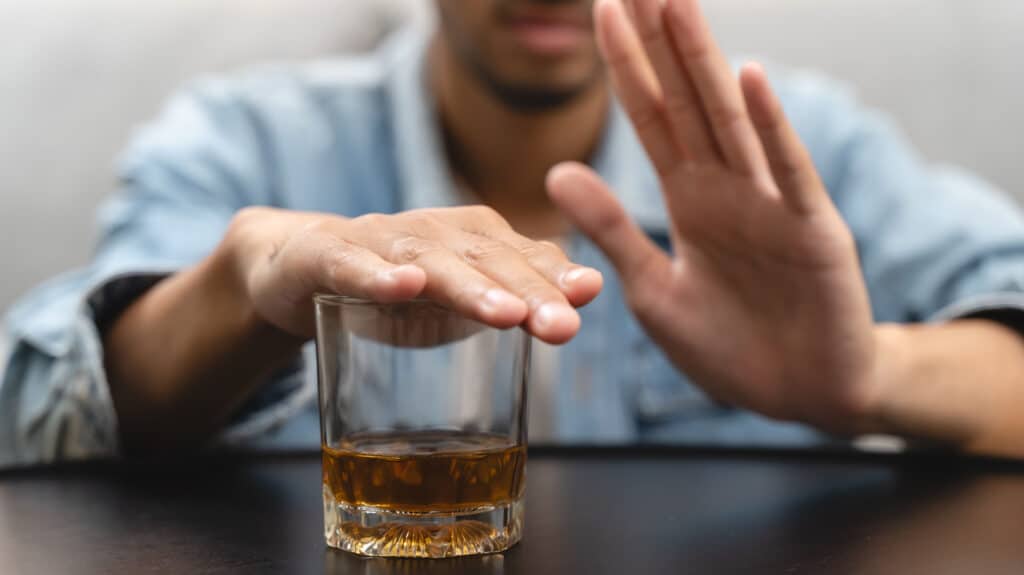While alcohol is the most commonly used addictive drug, many people become addicted to other substances, such as illicit drugs and prescription opioids. When recovering from an addiction to a drug other than alcohol, you might wonder if it’s OK to drink. Here’s what you should know.
Can You Drink Alcohol When In Recovery From Drug Addiction?
In general, when recovering from any type of substance use disorder, it’s safest to avoid alcohol.
Most forms of drug abuse, including alcohol abuse, cause dopamine to flood your brain. Dopamine is a neurotransmitter (chemical messenger) that plays a role in pleasure, reward, and motivation.
If you drink alcohol while in recovery, the surge of dopamine could remind you of your drug of choice. You may then experience intense cravings that lead to a relapse.
Increased Risk Of Relapse
Alcohol can also increase your risk of relapse due to its cognitive effects, including impaired judgment, lowered inhibitions, and impulsivity.
Not everyone who drinks alcohol in recovery will relapse. Factors that increase your risk of relapse include:
- stressful life events, such as divorce, job loss, or the death of a loved one
- co-occurring mental health conditions, such as depression, bipolar disorder, or post-traumatic stress disorder (PTSD)
- a family history of addiction or other mental health conditions
Even without these risk factors, drinking alcohol may threaten your long-term recovery.
Worsened Mental Health
In addition, regular alcohol consumption may cause or worsen mental health concerns like anxiety and depression.
When left untreated, these issues could contribute to a relapse. That’s because you might try to self-medicate them by drinking more alcohol or returning to other forms of drug use.
How To Reduce Your Risk Of Relapse When Drinking In Recovery
If you still want to drink alcohol in recovery, you can take steps to lower your risk of relapse:
Drink In Moderation
Any amount of alcohol can damage your health. However, you’re more likely to relapse if you drink excessively.
According to the National Institute on Alcohol Abuse and Alcoholism (NIAAA), excessive drinking occurs when a female has more than 1 drink per day or a man has more than 2 drinks per day. A “drink” is any beverage that contains about 14 grams of pure alcohol.
This amount of alcohol appears in 12 ounces of regular beer, 5 ounces of wine, and 1.5 ounces of liquor. You should also avoid binge drinking and heavy drinking. Binge drinking means:
- consuming at least 4 drinks in about 2 hours for females
- consuming at least 5 drinks in about 2 hours for males
Heavy drinking means:
- consuming at least 4 drinks per day or at least 8 drinks per week for females
- consuming at least 5 drinks per day or at least 15 drinks per week for males
Overall, the less you drink, the better.
Seek Support
When drinking in recovery, you need a strong support system to hold you accountable and help you manage stressful situations.
Along with family and friends, you should seek support from a therapist. Your therapist will teach you important coping skills that can help you keep your alcohol use under control.
You should also attend support groups for people with addiction, such as:
- Narcotics Anonymous (NA)
- LifeRing Secular Recovery
- SMART Recovery
- Women for Sobriety
Know Your Triggers
A trigger is a feeling, place, or other stimulus that makes you want to use your drug of choice again. You can lower your risk of relapse by avoiding alcohol whenever you encounter a trigger.
For example, you should not drink when experiencing stress, grief, or other difficult feelings.
You should also not drink around people you used to do drugs with or in environments associated with drug use, such as bars, clubs, or parties. Your therapist can help you identify your specific triggers.
Practice Self-Care
In general, the healthier you feel, the lower your risk of relapse. That’s why you should practice self-care by:
- getting at least seven hours of sleep per night
- eating plenty of vegetables, fruits, and other healthy foods
- staying physically active
- reaching out to supportive loved ones on a regular basis
- making time for relaxing activities, such as journaling, meditating, and enjoying the outdoors
Learn The Signs Of Alcohol Addiction
Some people who drink in recovery develop alcohol use disorder (alcohol addiction) without realizing it. Before you start drinking, make sure you and your support system understand the signs of alcohol addiction. These signs include:
- mood swings
- irritability
- frequent cravings for alcohol
- loss of interest in activities once enjoyed
- loss of motivation
- isolation
- drinking in unsafe situations, such as while driving or operating heavy machinery
- tolerance (needing increasingly larger amounts of alcohol to feel the desired effects)
- physical dependence (experiencing withdrawal symptoms, such as nausea and anxiety, when you don’t drink alcohol)
If you experience these symptoms, seek help at an inpatient or outpatient addiction treatment program right away. Your treatment team can help you get back on the road to recovery. After you complete treatment, you should avoid all drugs, including alcohol.
To learn more about substance abuse treatment, please reach out to Northeast Addictions Treatment Center. Our board-certified healthcare providers offer mental health counseling, medication-assisted treatment, and other evidence-based services to help you or your loved one stay sober.
People Also Read:
- Top 7 Life Consequences of Alcohol Abuse
- Why Alcohol Is More Dangerous Than Heroin & Other Drugs
- Does Addiction Ever Go Away?
Sources:
- Centers for Disease Control and Prevention — Alcohol Use and Your Health
- National Institute on Alcohol Abuse and Alcoholism — Drinking Levels Defined
- Society for the Study of Addiction — Overlooked and underestimated? Problematic alcohol use in clients recovering from drug dependence

